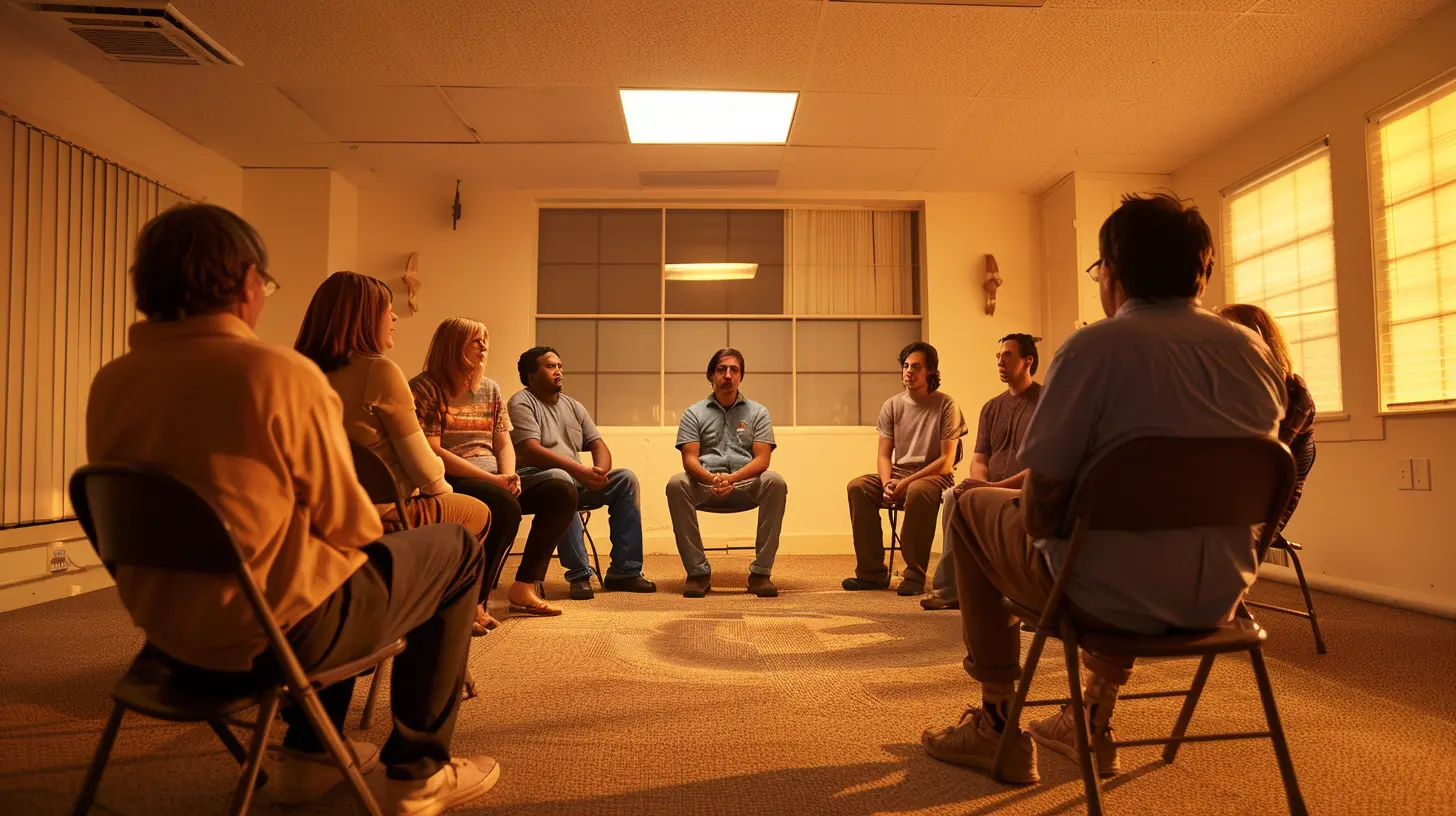Overcoming Fear of Judgment in Group Therapy
28 September 2025
Let’s be honest—group therapy can sound about as fun as walking into a middle school cafeteria and realizing you forgot to wear pants. You’re expected to sit in a circle of strangers and talk about your deepest fears, all while trying not to sound like the human version of a crumpled-up self-help leaflet.
If your stomach’s already doing acrobatics at the mere thought of it, you’re not alone. One of the biggest roadblocks that keeps people from fully diving into group therapy is the fear of judgment. That “oh no, what if they think I’m weird/broken/a hot mess?” feeling is as real as it gets.
But here’s the surprising truth: group therapy is one of the most powerful ways to heal, grow, and reclaim your voice. And yes, it's totally possible to let go of that judgment monster clinging to your back. So grab your mental marshmallows, and let's roast that fear over the fire of self-awareness.

What Exactly Is the Fear of Judgment?
Fear of judgment is that nagging voice in your head whispering, “They’re going to think you’re ridiculous for saying that.” It pops up anytime you’re vulnerable or stepping outside your comfort zone.In group therapy, this fear often shows up as:
- Reluctance to speak up
- Over-thinking every sentence
- Comparing yourself to others
- Shutting down emotionally
- Or even avoiding therapy altogether
It’s not just shyness. It’s a powerful psychological fear rooted in our need to be accepted and liked—because back in caveman days, being left out of the tribe meant you were dinner for lions. Today, lions are gone (thank goodness), but that fear of rejection still has a VIP lounge in our brains.

The Good, The Bad, and The Judgment
Before we tackle how to overcome it, let’s acknowledge the elephant in the room: Yes, people sometimes judge. But here’s the plot twist—most of the time, it’s not about you. It's about them.Let’s break it down:
- People are often too focused on their own problems to hyper-analyze yours. Everyone’s got stuff. While you’re worried about being judged for crying, they might be panicking over what they’ll say next.
- First impressions fade fast. Even if someone does initially judge, they’ll likely revise that opinion once they hear more from you. Humans are dynamic. So are our thoughts.
- Judgment doesn’t have to define you. Someone thinking you’re too emotional, too quiet, or too intense says more about their filters than your truth.

Why Group Therapy Freaks Us Out (But Shouldn’t)
Group therapy is a little like reality TV—strangers in a room, sharing emotions, with no script. It’s unpredictable, raw, and sometimes messy. And unlike one-on-one therapy, there’s an audience.This makes it a breeding ground for judgment fears.
Here’s why it pushes all the buttons:
- You feel exposed. Talking about your inner world in front of others is the emotional equivalent of wearing socks with sandals on a red carpet.
- You’re stepping into unfamiliar social dynamics. Who are these people? Will they understand me? Will I fit in?
- There’s no invisibility cloak. You can’t just sit and nod like in a lecture—eventually, it’ll be your turn to share.
But here’s the thing—group therapy isn’t designed to put you on trial. No one’s recording your performance for a Yelp review. It’s a safe, structured space with a trained facilitator whose entire job is to make sure everyone feels heard, respected, and supported.

Steps to Overcome Fear of Judgment in Group Therapy
Let’s talk game plan. You can totally break free from judgment anxiety—even if it’s wrapped around you like a weighted blanket.1. Normalize the Fear
First off, don’t beat yourself up for feeling nervous. Everyone’s got a little “what will they think?” voice inside their heads.Even the most confident-looking person in your therapy group probably rehearsed what they’d say in the mirror three times. Fear is human.
2. Start Small
You don’t have to share your darkest trauma on day one. Begin with something low-stakes—a comment, a nod, a “me too” when you relate to someone else’s story.Like dipping your toe in the water before cannonballing into the deep end.
3. Challenge the Inner Critic
That voice telling you “you’re not interesting enough” or “they’ll all think you’re weak”? That’s not truth. That’s your fear wearing a megaphone.Start questioning it.
- Would I judge someone else for sharing this?
- Have I ever respected someone more for being vulnerable?
- What evidence do I have that people will think negatively of me?
Spoiler alert: Your inner critic is usually a drama queen.
4. Focus on Connection, Not Performance
Group therapy isn’t a TED Talk. You don’t need snappy one-liners or perfect grammar. The goal is connection, not perfection.Speak from the heart, even if it comes out messy. Especially if it comes out messy.
5. Use Humor (Yes, Seriously)
Humor is like social WD-40. It loosens up awkwardness and helps you feel less tense. You don’t need to be a stand-up comedian, but allowing yourself to smile, laugh, or make light of your own fears can create room for comfort.Example: “I feel like I need a neon sign that says ‘Nervous Newbie Here!’” Boom—instantly relatable AND human.
6. Remember Everyone’s in the Same Boat
Group therapy may feel like a spotlight, but really it’s a campfire. Everyone’s gathered around for warmth and healing. No one’s above or below you.Everyone’s got scar tissue. That’s what makes the group powerful—shared humanity.
7. Practice Outside the Group
Work on your fear of judgment in safe, everyday settings. Open up a little more with friends. Share a vulnerability on social media. Tell someone you trust about your therapy experience.These micro-moments of honesty strengthen your internal “I got this” muscle.
8. Lean on the Facilitator
Your group therapist wants you to feel supported. They’re trained to manage group dynamics, deflate judgmental behavior, and create safety.If something feels off—or if someone does make a snarky comment—bring it up with the facilitator. You’re not exaggerating or “being too sensitive.” You’re advocating for yourself.
9. Celebrate Small Wins
Spoke up during check-in? Win.Offered feedback to someone else? Double win.
Shared something you never thought you would? You’re basically a therapy ninja now.
Progress isn’t always loud or obvious. Give yourself credit for every brave moment, no matter how small.
When Judgment Happens Anyway (Because Sometimes It Does)
Let’s be real—no space is 100% judgment-free. People carry biases, insecurities, and baggage. Sometimes, someone in the group might unintentionally say something that stings.Here’s what to remember:
- You can’t control others, but you can control your response. You can choose to speak up, process it with the therapist, or journal about how it made you feel.
- One person’s opinion does not invalidate your experience. You’re still valid. You're still enough.
- Discomfort isn’t always bad. Sometimes it’s a signal. Sometimes it’s a growing pain. Either way… it’s information.
The Magic That Happens When You Push Through
Once you start peeking past the fear? That’s where the gold is.- You realize you’re not alone, and never were.
- You connect with people at a raw, beautiful level.
- You get new perspectives that help you see your story differently.
- You laugh, cry, and sometimes do both in one session.
- You build emotional muscles you didn’t know you had.
And most importantly?
You prove to yourself that vulnerability doesn’t have to be terrifying—it can be freeing.
Final Thoughts: From Judgment to Joy
Getting past the fear of judgment in group therapy is like untangling a necklace chain. It takes patience, gentleness, and a little detective work. But when you finally slip that chain over your head, you realize it was never about looking perfect—it was about showing up.You don’t have to be fearless to participate in group therapy. You just have to be a little braver than your fear.
So go ahead. Speak up. Mess up. Show up. Because your story deserves to be heard—and you never know who in that group needed to hear it most.
all images in this post were generated using AI tools
Category:
Group TherapyAuthor:

Jenna Richardson
Discussion
rate this article
1 comments
Raina Thornton
Great insights! Overcoming fear is crucial for healing.
October 3, 2025 at 4:23 PM

Jenna Richardson
Thank you! I completely agree—facing our fears is essential for personal growth and healing in group therapy.


